Light in a Watery Darkness
Finding a Way with Consecrated Identity
When the Jaredites arrived at the ocean that lay between themselves and the promised land, the Lord instructed them to build barges. Though the blueprints were “after the instructions of the Lord” (Ether 2:16), in them there was no air, no light, and no steering. Not surprisingly, the Jaredites had some major concerns about this. I imagine that band of voyagers eyeing those barges lined up on the shore and wondering if there had been some kind of mistake. It must have seemed insane to climb inside those dark, suffocating vessels, trusting that they would crawl out alive on the other side.
But at the same time, it also feels very relatable. Like the Jaredites, the Lord’s blueprint given to me as a gay Latter-day Saint has left me with some serious questions. It can be hard to stay aboard “the old ship Zion” (as Brigham Young calls it) because as “tight like unto a dish” as the vessel may be, it can also feel like a dark, suffocating place for me—not unlike a cramped barge with no lighting, no steering, and no air.
I remember sitting at a bus stop at the end of my mission in 2006, mentally preparing to go home and praying fervently, “Well, God? Now what?” I had just spent two years teaching a model of faith and family that I knew well, and now I wondered how it was supposed to work for someone like me, especially when it came to the Church’s teachings about marriage. I was frustrated that most of my companions were so joyfully looking forward to marriage and family. Everything about the gospel program seemed to align neatly with their DNA. But how in the world was I going to start this journey to my promised land? Could I ever fall in love and be attracted to a woman? If not, would I be able to manage a lifetime of celibacy and loneliness? Would my attraction toward men persist into the next life?
These questions rattled me. Even though I had experienced an undeniable spiritual confirmation that Jesus Christ accepted my feelings of same-sex attraction, and that he loved me exactly how I was, I could not make sense of how this was going to work. Sitting there at that bus stop in Honduras and facing the vast sea that lay between me and what I had been taught I needed to become, I wondered how the barge of my covenants could get me there, or if I’d end up drowning or suffocating somewhere along the way.
In answer to the Jaredites’ concerns, the Lord recommended they cut holes on either side of the barge for them to unstop for air and then quickly seal them up again if the waves came in on their heads. Not altogether reassuring in the middle of the ocean, especially with the suggestion that they would need a hole on either side because the entire boat would likely be flipping over repeatedly (along with everyone and everything inside it, including hives of bees, apparently), but sure. For steering, the Lord promised that he would blow them wherever they needed to go. Also not exactly the answer I would want, as someone who likes control, but coming from a God speaking to me in a literal cloud, perhaps I could be persuaded. But then comes the brother of Jared’s final question, the one which, to me, is the most haunting of all:
“O Lord, wilt thou suffer that we shall cross this great water in darkness?” (Ether 2:22)
The Lord’s response brings an unexpected challenge:
“What will ye that I should do that ye may have light in your vessels? For behold, ye cannot have windows, for they will be dashed in pieces; neither shall ye take fire with you, for ye shall not go by the light of fire . . . Therefore what will ye that I should prepare for you that ye may have light when ye are swallowed up in the depths of the sea?” (Ether 2:23-25)
This little piece of dialogue between the Lord and the brother of Jared has profound meaning to me, as I have had to plead, in my own way, “Lord, wilt thou suffer that I cross this great water in darkness?”
When I was young and trying to make sense of my sexuality, I went through some harrowing emotions, most of which I managed to keep hidden, hoping my attractions would change or go away. I remember highlighting in my scriptures every reference I could find to healing and miracles. Faith brought miracles, I learned, and if I wanted a miracle, then I was willing to make whatever sacrifice was asked of me. I trusted that if I put my sexuality on the altar, God would guide me on my journey to the celestial kingdom. The barge of my covenants would get me where I needed to be. In a leap of faith, I served a mission, married, and had a family.
A mixed-orientation marriage is not the recommended path for most persons attracted to the same sex, and I recognize that others have very different experiences from mine, but when I fell in love with my wife, it was electric. I wanted to share my whole self with her. I couldn’t stop thinking about her. She was beautiful, both inside and out. There were hormones, attraction, and all the rest. I thought naively, My struggle with same-sex attraction is over! It felt like a miracle. With the limited resources about homosexuality that existed back then, I assumed I was “cured.” However, in that first year of marriage I realized, with renewed terror, that I really wasn’t. It would take years for me to realize there wasn’t anything to cure.
Sexuality is complex, and a simple gay/straight binary breaks down in situations like mine. A person’s sexuality is about more than just sex, and can include, as it does for me, other aspects of personality, identity, and attraction, like yearning for emotional connection with other men. Navigating between gay and straight categories as a heterosexually married man who is primarily attracted to men has its own set of unique challenges, one of the hardest of which is never completely belonging to either ingroup. Making peace with the label “gay” has been immensely important for me, as opposed to “bisexual,” which, though it has some application, leaves the impression that as long as I am attracted to my wife, then whoever else I am attracted to is irrelevant, like a straight married man who happens to be attracted to other women. This disregards the pain and loneliness that often comes with having a non-heterosexual orientation.
I remember the moment after my marriage when I realized the men in my university classes were just as attractive to me as they were before, but I resolved to give it my best, to hunker down and stay focused on being the best husband and father I could be. All the same, my discipleship began to feel less like a cruise ship of blessings and more like a Jaredite barge. And like the brother of Jared, I especially wondered about the lighting. Is it supposed to be so dark in here? Even after giving every possible effort, I found myself staring into the abyss of unanswered prayers and a lingering loneliness that only seemed to grow inside me. As the years passed, I began to wonder if I was worshiping a God who was so out of touch with mortality when he designed these covenant vessels that he somehow forgot we needed to breathe and steer and see. Or at very least, I wondered if his prophets were out of touch, especially when the seemingly impossible scenario of the gay Latter-day Saint was left unresolved semi-annually, and the doctrine set out in the family proclamation seemed unlikely to ever change.
This was the beginning of my faith crisis. The framework of obedience and sacrifice that had worked for me for almost thirty years suddenly stopped working. I developed anxiety. Social interactions, especially at church, began to exhaust me. I still had a testimony of the Church, but I was spending most of my energy there trying to fit in. My love and attraction to my wife continued to grow as we stayed open and honest with each other about the unique challenges we both faced in our relationship, but I was beginning to feel more and more disconnected from myself. My understanding of the gospel felt incomplete.
I had a conversation with a friend who tried to help me by sharing a version of the “two wolves” analogy. “Inside of you are two wolves fighting,” he explained. “Which of them will win? The one you feed.” He meant well, but I remember my soul breaking in pieces. I had spent my whole life depriving this “wolf” of same-sex attraction, but the more I neglected it, locked it in the closet, the more I starved it, the more desperate and ferocious it became. I tried to explain to him that if being gay was some kind of wolf that needed to be deprived, it would only start eating me from the inside and would eventually kill me. There had to be some answer to what I was going through besides shoving my gay identity more securely into the closet.
About five years ago, I felt myself unravelling. It wasn’t helpful that this coincided with a global pandemic, financial stresses, and my wife’s own faith crisis and mental health breakdown. I was always taught that sacrifice brought blessings, but there I was, continuing to make tremendous sacrifices and wondering why so many things in my life were falling apart. During a particularly difficult time, when it seemed as if every miracle I had experienced in my life was coming undone, I sat in the temple and poured out my soul, contemplating with deepest sorrow the covenants I had made and wondering whether the Lord had somehow forgotten his part of the deal. What was I missing in all of this?
As I sat through the endowment session, I realized that obedience and sacrifice, which was how I typically understood my sexuality, were only the first steps in a series of covenants designed to bring me to wholeness with myself and closer to Jesus Christ. After covenanting to keep the law of chastity, the final covenant in the endowment ceremony is to consecrate. What did it mean for me to consecrate my gay identity, as opposed to sacrificing it? Instead of giving up my identity to follow Christ, was there a way for me to hold onto my faith and still be who I am? Was there a kind of discipleship I could live outside the closet?
That day in the temple, I felt the Savior inviting me back to the altar to pick up the pieces of myself I had laid at his feet so many years ago as an eighteen-year-old boy and to integrate them back in. I realized I could never be made whole without my sexuality, because it is a sacred and integral part of who I am. I could not arrive at the throne of God as fragmented as I had become.
I am still learning how to consecrate all that I am as a gay disciple of Christ, to make sacred with God those parts of myself I once defined as unholy, and to present myself wholly to the Lord. This often involves taking the energy I spend trying to fit in at church by imitating things like speech patterns, hobbies, and physical appearance and redirecting that energy to work on just being more myself. In a church where heterosexuality is not just a culture but an entire theology, it takes courage for me to embrace those parts that don’t fit the mold and trust that the Lord wants me to be the person I was created to be. That might include wearing a flower brooch to church, writing poetry, or sharing comments in quorum meetings using words like “fabulous.” It might mean singing along to Cher loudly with my kids in the kitchen.
But more substantially, I believe it means consecrating my creativity, my sensitivity, and my hunger for emotional intimacy with men and offering all of it to help build a church culture that is better at providing connection and compassion. That was the part of me I felt the Savior giving back that day in the temple. It was an invitation to take who I am as a gay man, unbury my talents, and use them to build up the kingdom.
Sometimes I’m surprised by how this plays out. For example, I recently led a discussion with a group of ward leaders about how to make a quorum a better place for connection. As I brought up the need for greater emotional openness, there was a flurry of discussion and visible tears as men opened up about their struggle to create spaces of vulnerability. In a culture where marriage is sometimes taught as the be-all and end-all of relationships, the obvious truth I encountered is that there are barriers around building brotherhood and developing friendships for many men, regardless of sexual orientation. Gay men aren't the only ones who feel that hunger! It seemed to me that we all left that meeting with a greater resolve to make church a place of brotherhood and belonging. My offering was being consecrated that day.
It requires revelation, both prophetic and personal, to know which pieces of myself to pick up and which pieces to leave on the altar. Discovering ways to consecrate myself has been the most challenging, yet also most rewarding and truly expansive part of what it means for me to walk the covenant path. In my experience, what feels darkest in these barges of covenant keeping is not necessarily the difficulty of keeping covenants itself, but rather the exhaustion of hiding myself or feeling that what I offer isn’t welcome. Feeling seen, accepted, and valued can make all the difference, and can turn something challenging and painful into something joyful and connecting.
In the process of consecrating myself as a gay disciple of Christ, I have felt impressed at various times to be more open at church about my sexuality. The first time I came out to my bishop was in 2008 during the height of the Proposition 8 campaign in California to legally define marriage as between a man and a woman. I was still vulnerable in my faith, and I wanted reassurance that I belonged, because the rhetoric in my church meetings back then was anything but accepting toward gay members. While my bishop was kind and understanding, I was immediately released from my calling teaching the youth and reassigned to do the ward bulletin. I felt discouraged, like who I was as a gay man needed to be contained somehow, especially during a time when simply existing as a gay member was seen by many as an attack on Church teachings.
Years later, I tried coming out to Church leaders again. This time, I was met not only with warmth and acceptance but was given unexpected Church assignments where I could offer my time and talents and feel valued. After opening up to one leader in particular, he took my face in his hands, looked in my eyes, and told me how much he loved me, how much he was learning from me, and how much the Church needed me. In that moment, I felt not only this leader’s love, but the love of my Savior through him.
The path toward wholeness with Christ may look different for different people who are trying their best to navigate a spectrum of sexualities and gender identities, and I understand and respect why others make different choices. In my situation, I have chosen to follow commandments as I understand them. As he did for the brother of Jared, God has pointed out to me some things that would not be good lighting in my journey. Coming to the Lord and praying to know if I should pursue a sexual relationship outside of what he has revealed to me, for example, would feel like the brother of Jared coming back to the mountain and saying, “I was thinking fire would make good light for my barge after all. Don’t worry; I’ll be very careful with it. I’ve constructed a very safe fireplace for it.” For whatever reason, God has commanded me, “Ye shall not go by the light of fire.”
Christ’s gospel, like his love, brings wholeness. During times when discipleship feels dark, or when questions loom large, the brother of Jared shows me how to capture the light of Christ’s love by taking his invitation seriously to come up with solutions to provide light in dark barges. The brother of Jared went to work making clear white stones out of molten rock. This involved no small effort to melt down and refine rock to clear glass—incredible heat, pressure, and time to make those sixteen little stones. Then the brother of Jared took those stones that still did not give off any light by themselves (even after all that work!) and made the trip up the mountain to ask the Lord to touch those stones and make them shine.
And shine they did.
Consecrating who I am as a disciple of Christ can be very hard work, at least as difficult as refining down rock into clear glass. But when I bring my stone of discipleship to Christ, asking him to bless my efforts, his light, through my offering, shines brighter. I also recognize that discipleship is difficult work for those who do not identify as gay. They are also learning difficult lessons to refine themselves in order to love and support those in their wards and families whose experiences, choices, and sexual feelings are wholly unfamiliar. But when they do, Christ's light shines brighter.
As I have persisted in my covenants over many years, the light in my barge has always been the love I feel from Jesus Christ—that because of Jesus Christ, I really do belong in his Church, even when I am made to feel that I do not. I also feel joy when I open up about my struggles and am met with connection, compassion, and love from my fellow travelers.
For anyone who has ever had to ask questions about how same-sex attraction fits into the plan of salvation, either for themselves or a friend or family member, I believe we can bring our painful questions to Christ and feel not only his compassion, but his gentle invitation to work with him to find new and innovative ways to make these barges brighter. “What will ye that I should do that ye may have light in your vessels?” God wants us, straight members as well as gay, to work together to find solutions to these problems.
While some experience the Church as an impossible place for gay members—and certainly there is homophobia and ignorance that needs to be rooted out wherever it is found—nevertheless I have found that a covenant relationship with Jesus Christ is a safe vessel for me to cross this ocean in. Instead of hiding who I am or trying to “cure” my sexuality, I am learning to consecrate who I am to build God's kingdom in whatever ways I can. This brings me joy. As I follow Christ’s example to love more courageously, especially to better love and accept myself, discipleship is not the dark and lonely barge it used to be.
Christopher is a poet, writer, nurse, husband, and father of five. He lives in Raymond, Alberta, Canada.
Art by J.M.W. Turner (1775-1851).
Find more Wayfare content on the LGBTQ+ experience in faith communities here.



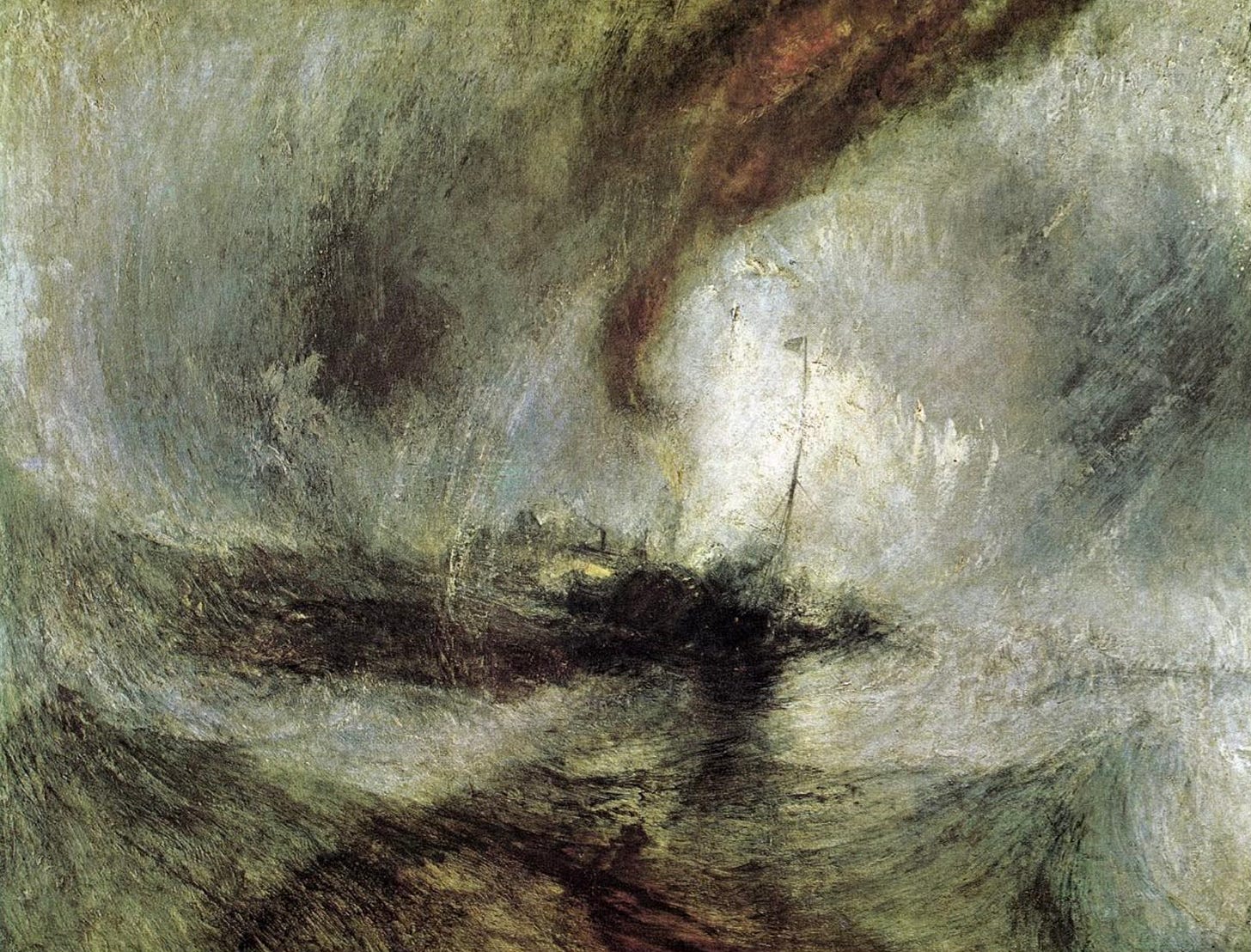
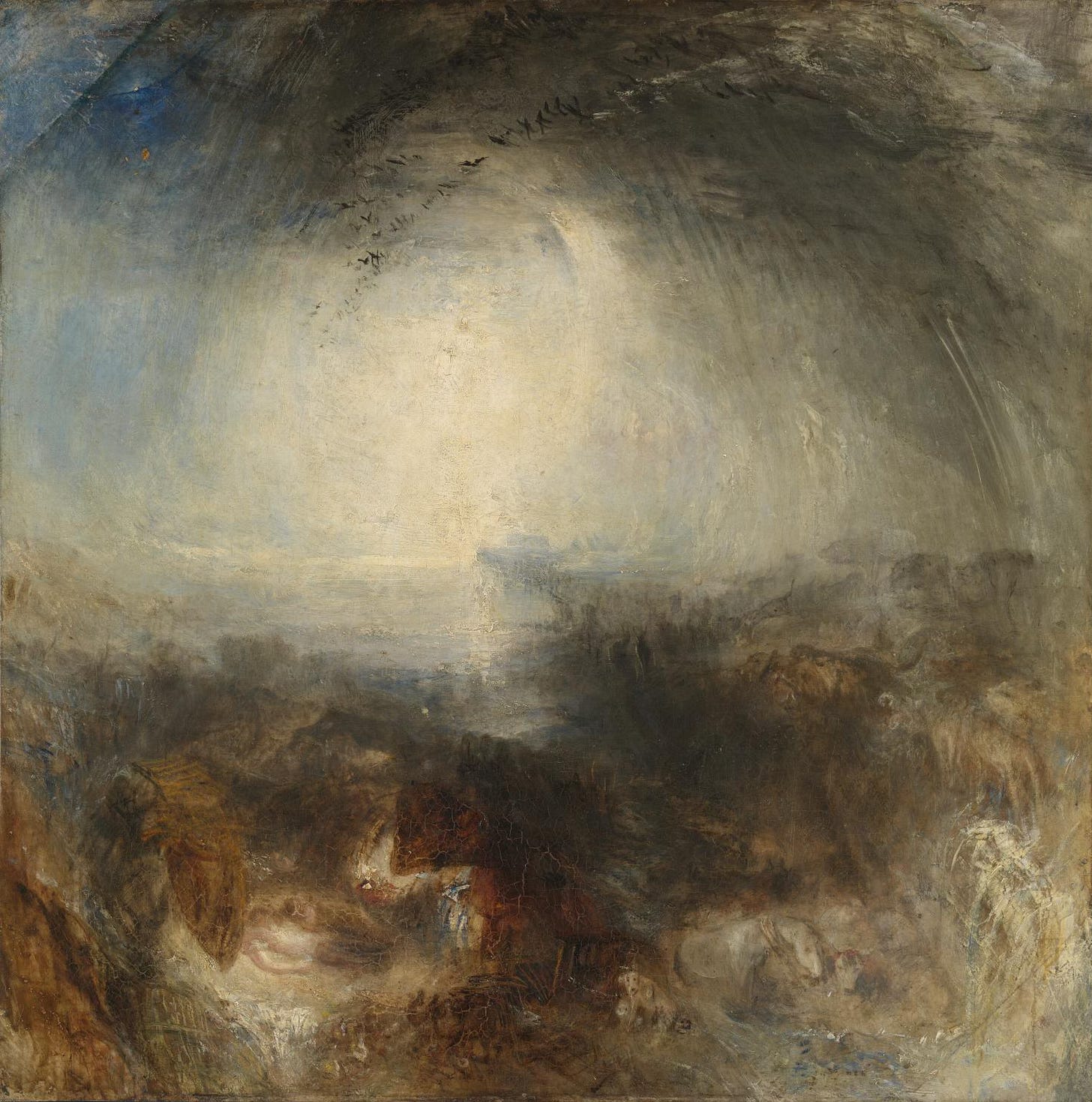
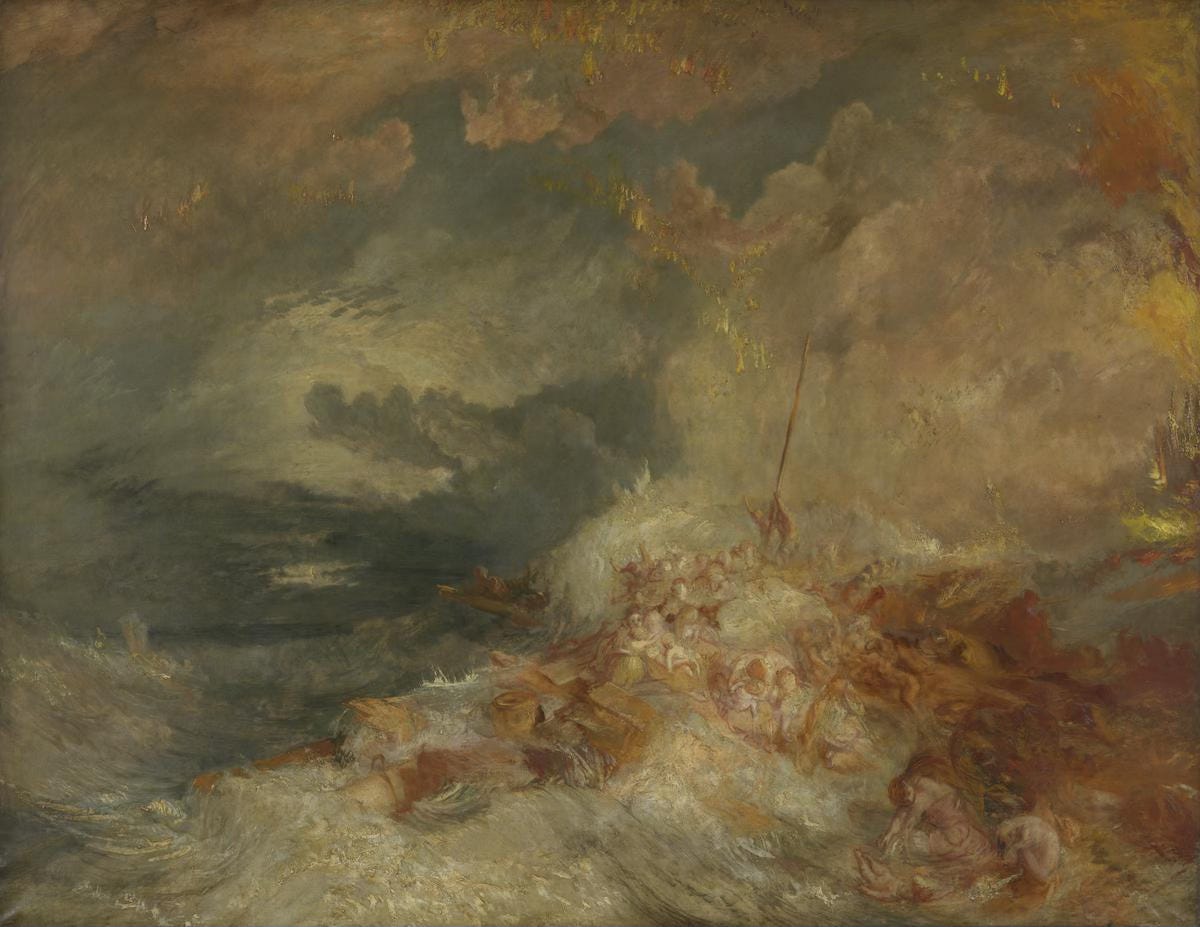
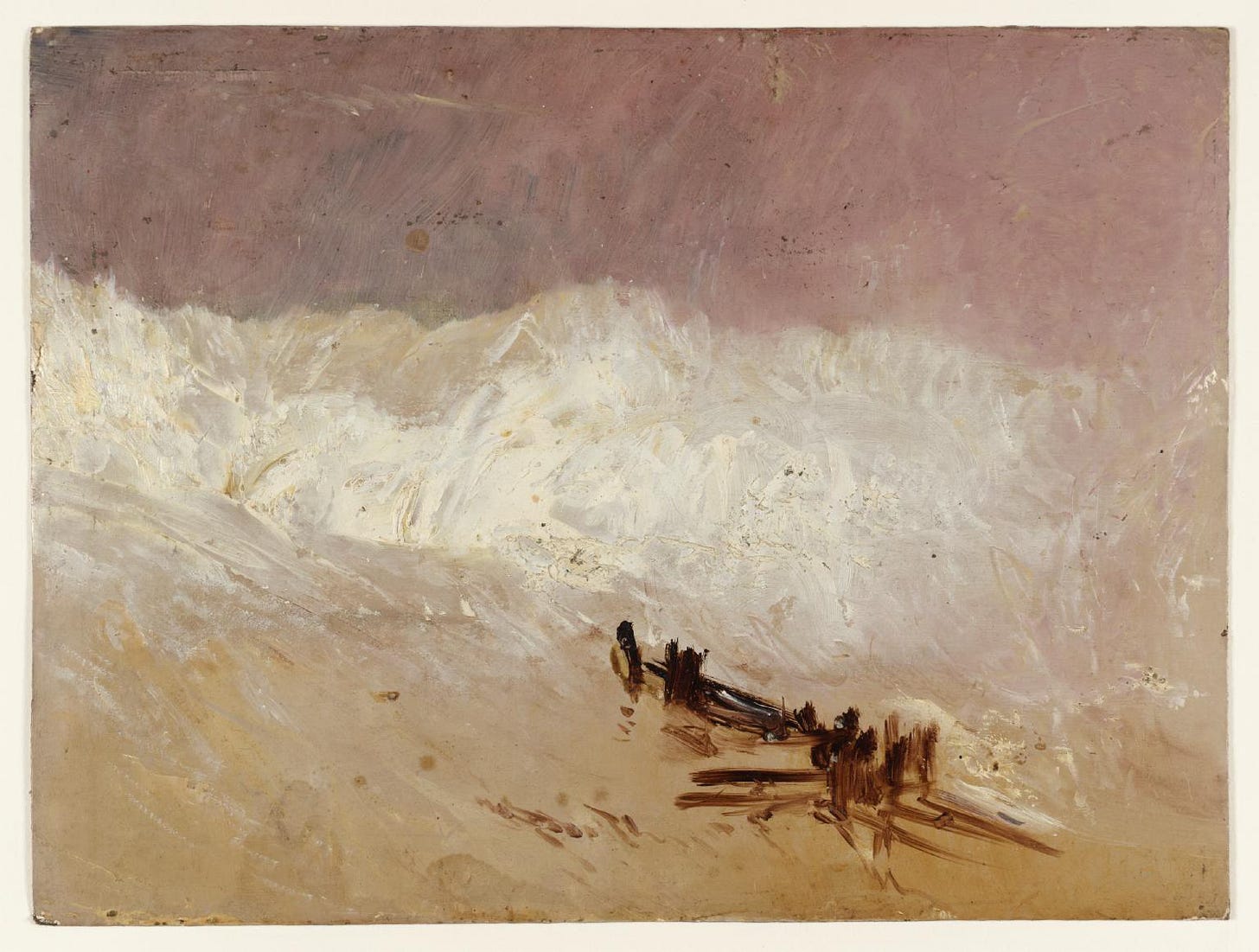
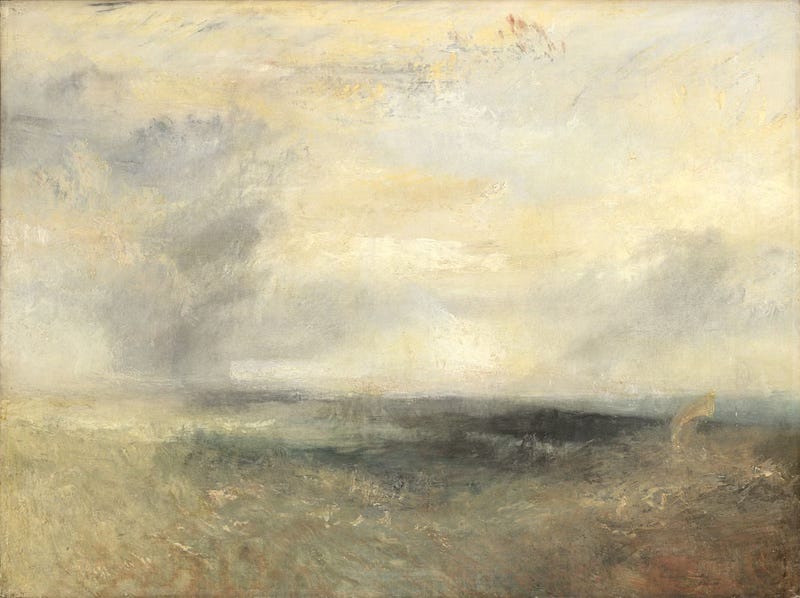
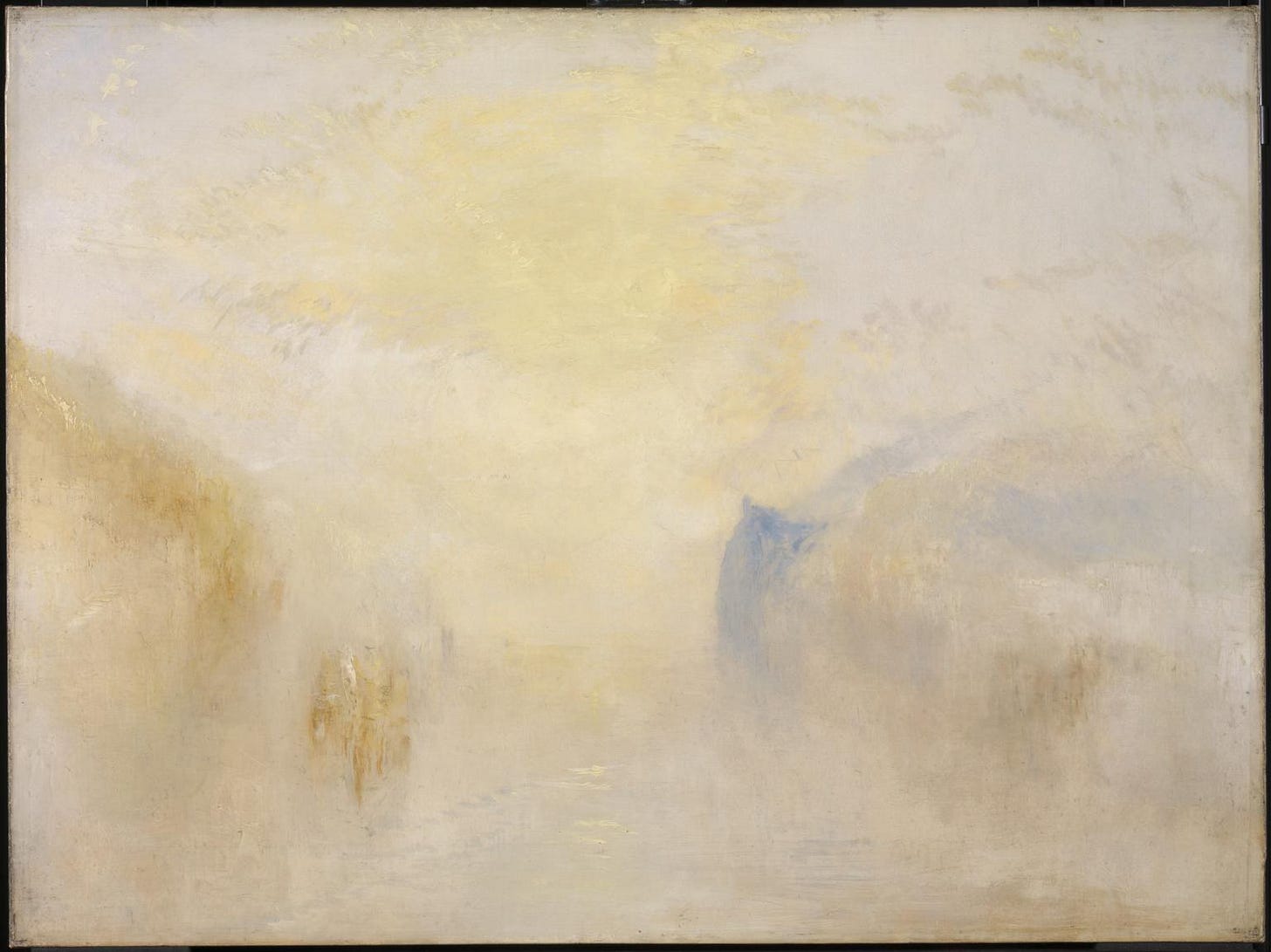

Amazing, Christopher - a real gift. Please keep writing and being you.